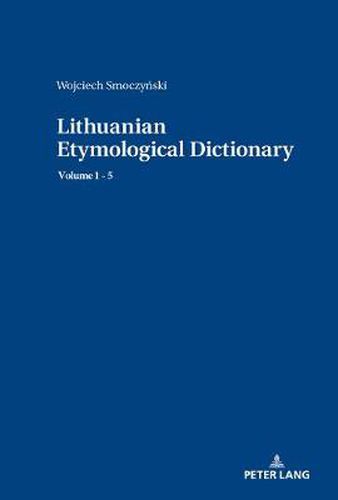Readings Newsletter
Become a Readings Member to make your shopping experience even easier.
Sign in or sign up for free!
You’re not far away from qualifying for FREE standard shipping within Australia
You’ve qualified for FREE standard shipping within Australia
The cart is loading…






Um die Hardcover-Version dieses Buches zu bestellen, kontaktieren Sie bitte [email protected]. (Ladenpreis D: 144,75EURO, Ladenpreis AT: 144EURO, UVP: 165CHF) Zum Erwerb des Ebooks gehen Sie bitte zu 978-3-631-76369-8
For ordering the hardback version please contact [email protected]. (Retail Price: 159,75$, 110GBP), For puchasing the ebook please go to 978-3-631-76369-8
This dictionary offers up-to-date and often novel etymological accounts for the basic lexicon of Modern Lithuanian. Building on the achievements of earlier etymological research but fully exploiting the new insights afforded by the current paradigm of Indo-European reconstruction, this dictionary presents numerous items of the dialectal, Old Lithuanian and borrowed vocabulary. The author shows the workings of historical derivational morphology, highlighting the importance of analogy, reanalysis and innovative ablaut derivation. He covers alternative proposals and exhaustive bibliographical references for this tool of research and study in Lithuanian, Baltic and Indo-European etymology.
$9.00 standard shipping within Australia
FREE standard shipping within Australia for orders over $100.00
Express & International shipping calculated at checkout
Um die Hardcover-Version dieses Buches zu bestellen, kontaktieren Sie bitte [email protected]. (Ladenpreis D: 144,75EURO, Ladenpreis AT: 144EURO, UVP: 165CHF) Zum Erwerb des Ebooks gehen Sie bitte zu 978-3-631-76369-8
For ordering the hardback version please contact [email protected]. (Retail Price: 159,75$, 110GBP), For puchasing the ebook please go to 978-3-631-76369-8
This dictionary offers up-to-date and often novel etymological accounts for the basic lexicon of Modern Lithuanian. Building on the achievements of earlier etymological research but fully exploiting the new insights afforded by the current paradigm of Indo-European reconstruction, this dictionary presents numerous items of the dialectal, Old Lithuanian and borrowed vocabulary. The author shows the workings of historical derivational morphology, highlighting the importance of analogy, reanalysis and innovative ablaut derivation. He covers alternative proposals and exhaustive bibliographical references for this tool of research and study in Lithuanian, Baltic and Indo-European etymology.